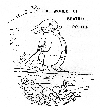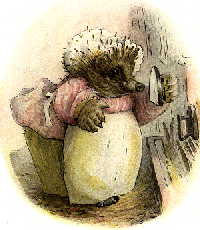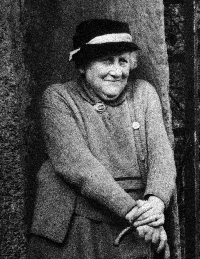Beatrix Potter and the Lake District

Beatrix Potter wrote and illustrated a series of small books for children, left a diary
of her youth in code, and created a fictional character, Peter Rabbit , that stands
alongside Alice in Wonderland and Peter Pan as one of the most memorable and enduring
characters in all of children's literature.
She is credited with having written the first picture story book, The Tale of Peter Rabbit,
blending words and illustrations into an inseparable whole and starting a tradition that includes
Make Way for Ducklings and Where the Wild Things Are.
Beatrix Potter was born July 28, 1866 into a well-to do London family and spent a considerable
part of her life as an unmarried daughter dutifully bound to her demanding parents.
It was not until she was nearly forty years old, after she had written and published Peter Rabbit
that she began to achieve her independence. Her life as an author and illustrator is tied directly
to her years as a property owner in the exquisite Lake District in England.
Her love for the Lake District had been growing since her childhood. Her family regularly spent
their summers there where her love of art and science combined and flourished. Her early
drawings show a fascination with plants and animals.
When Beatrix Potter was in her early twenties, she made a minor scientific discovery regarding
the "spores of moulds." Because she was self-taught, her work was highly suspect by botanists
at the Royal Botanic Gardens. She persisted and, with the encouragement of her uncle, wrote a
paper on the subject. It was read before the Linnean Society of London, but not by
Beatrix. Women were not allowed to attend meetings. Her discovery and theories eventually
proved accurate.
Her life as a young adult was plagued with illness and tragedy. During her twenties and thirties,
she suffered from fatiguing headaches and fainting spells. She was lonely, always tired and had
"odious fits of ill spirits" which today we would recognize as depression.
In her late thirties, she began her publishing adventures. Through them she met Norman Warne,
a shy kind-hearted bachelor from the famous publishing family. She corresponded and spoke
with him frequently for several years during which they found their relationship deepening.
Although Beatrix was nearly forty when Norman Warne sent her proposal of marriage, her
parents felt the Warne family was beneath her station and strongly opposed the marriage.
Beatrix, though a dutiful daughter in every respect, defied her parents and accepted Norman's
proposal. The marriage was not to be, however, for Warne died of an advanced case of
leukemia shortly after the proposal.
Her first story, The Tale of Peter Rabbit , was conceived as a letter to the children of her
friend and former teacher, Annie Carter Moore. It was so popular with them, that Ms. Potter was urged to
create a book which she self-published. It sold. With the proceeds from it and several to follow,
she bought two properties in the Lake District: Hill Top , a rolling
farm near Sawrey, England in Lancashire and lovely Castle Cottage in the same area.
During this time, she met and married a solicitor, William Heelis.
The more time she spent in the Lake District, the happier she became and for nearly ten years she
pursued her love affair with the people, plants, animals and gentle rolling hills of the magnificent
Lake District.
She blossomed in spirit, independence and creativity. Her best books were written during this
period of her life. She produced book after little book for the very young blending pictures and
words into lyrical works of beauty. Each book captures in miniature her delight in nature and her
love of language. She said herself she "copied nature"-- the gentle, amiable nature of an English
village.
Visiting the town of Sawrey in the Lake District and Ms. Potter's home at Hill Top is to stroll
through her books. Rhubarb patches, flower gardens, low meandering stone walls,
doorways, and garden gates are mirrored so precisely that a her readers are at home there
immediately.
The Tower Arms Inn which sits on the edge of the tiny community of Sawrey
is captured in The Tale of Jemima Puddleduck. The doorway to Hill Top was made famous in
the same book. Roly Poly Pudding and The Pie in the Patty-Pan recorded the garden in
full bloom.
Ms. Potter is even said to have drawn the people of the community as animal characters in her
books. Mrs. Tiggy Winkle bears a striking resemblance to Ms. Potter herself in her later years.
Beatrix Potter was in love with her life in Sawrey and with the whole of HillTop. Her lyrical
delight is captured in her language as well as her illustrations. When Peter Rabbit was caught in
the gooseberry net, he was not asked to simple free himself. Instead, "Some friendly sparrows
flew to him in great excitement and implored him to exert himself." Although the words are
larger than the normal vocabulary for the age child who will hear the story, the meaning is clear
in the urgency of the situation and the tugging rhythm that the choice of words naturally
produces.
The Lake District is as lovely today as when Miss Potter captured it in her books. The two are
bound to immortality, for they will both bring delight forever. In The Tale of Tom Kitten, "Tom
was quite unable to jump when walking upon his hind legs in trousers." Anyone who has ever
tried to dress a kitten for a tea-party can see the humor. Tom's descendants still wander in the
lush green of the Lake District, intrepid, unclothed, and unaware of their connection to some of
the finest literature for children ever written.


